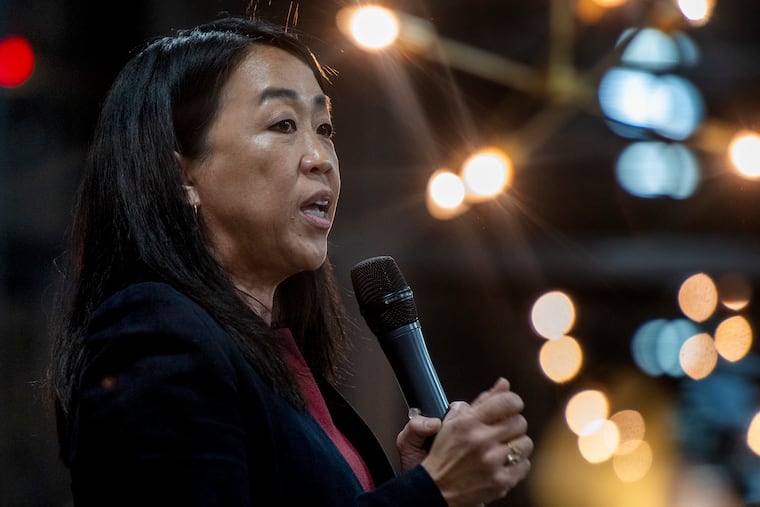Crime and public safety are the focus of a super PAC’s ads boosting Helen Gym for Philly mayor
The ads were paid for by a new PAC boosting Gym’s candidacy, which could be one of several outside groups to spend in the campaign.

A new political action committee emerged this week and spent six figures to begin running television commercials boosting Helen Gym in the Philadelphia mayor’s race, a sign of how outside groups are looking to influence the race in its final two months.
The ads are set to begin running this week, but it was not immediately clear who is behind the super PAC, called Fighting Together for Philadelphia. Financial disclosures weren’t available Tuesday, and the group isn’t required to reveal its donors until next month.
The ads are all about public safety and crime. One ad touts Gym’s work advocating for mental-health professionals to respond to some 911 calls, and says she’ll declare a state of emergency over gun violence.
Another says Gym will “put an end to the senseless violence and lawlessness that threatens our families and our future.”
The messaging underscores the major role crime is playing in the mayoral race, as polling shows most Philadelphians see it as the No. 1 issue facing the city. Gym, a former City Council member who has been aligned with the Democratic Party’s progressive wing, has long been known as an education activist. But she has also centered her campaign’s message on public safety, pledging to balance addressing gun violence while maintaining police reforms.
» READ MORE: The latest TV ads in the Philly mayor’s race include two ex-mayors and the first attack ad
Fighting Together for Philadelphia is spending nearly $400,000 over the next three weeks to run advertising on broadcast television, as well as radio programs that serve primarily Black Philadelphians, according to the media-tracking firm Ad Impact.
Independent expenditure groups, also called super PACs, can’t legally coordinate with the candidates they’re supporting, but they can wield significant influence and may out-spend the campaigns themselves. Super PACs are allowed to raise unlimited amounts of cash beyond the city’s campaign-finance limits for mayoral candidates, which are $6,200 a year from individuals and $25,200 a year from political committees.
Super PACs played a major role in the 2015 mayor’s race, when multiple groups, largely funded by organized labor, helped lift now-Mayor Jim Kenney in the competitive primary. The American Federation of Teachers and its local chapter were part of that effort — both are among Gym’s staunchest supporters.
Gym will be the fifth Democratic mayoral candidate to have a presence on television as the battle for Philadelphians’ attention heats up with fewer than eight weeks until the May 16 primary. The winner of the primary, which has drawn 11 candidates, is well positioned to win the general election, given Philadelphia’s heavily Democratic electorate.
Grocer Jeff Brown and former City Councilmember Allan Domb, both of whom are partly self-funding their campaigns, have been running television ads for months. Ex-City Controller Rebecca Rhynhart and former City Councilmember Cherelle Parker started airing television commercials this month.
» READ MORE: Sign up for the 100th Mayor, the Inquirer's mayoral race newsletter
The only other super PAC to emerge thus far is supporting Brown, a ShopRite proprietor. The group, called For a Better Philadelphia, spent more than $1 million on an early round of television commercials meant to introduce Brown to Philadelphia voters.
That super PAC raised more than $3 million in 2022, with more than 80% of those dollars coming from a nonprofit that has not had to disclose its donors to the city. Nonprofits that fund super PACs must do so only if the nonprofit spends more than $5,000 to influence a campaign within 50 days of the election, which this year is March 27. The group hasn’t purchased any television ads past that date, according to Ad Impact.
A third super PAC is expected to support Parker, who has also won support from organized labor, including the Philadelphia Building Trades Council and the regional carpenters’ union, both of which helped propel Kenney in 2015.